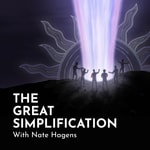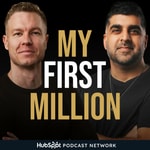The Great Simplification with Nate Hagens – Détails, épisodes et analyse
Détails du podcast
Informations techniques et générales issues du flux RSS du podcast.

The Great Simplification with Nate Hagens
Nate Hagens
Fréquence : 1 épisode/4j. Total Éps: 312

Classements récents
Dernières positions dans les classements Apple Podcasts et Spotify.
Apple Podcasts
🇨🇦 Canada - science
02/08/2025#70🇬🇧 Grande Bretagne - science
02/08/2025#62🇩🇪 Allemagne - science
02/08/2025#82🇺🇸 États-Unis - science
02/08/2025#53🇨🇦 Canada - science
01/08/2025#64🇬🇧 Grande Bretagne - science
01/08/2025#54🇩🇪 Allemagne - science
01/08/2025#94🇺🇸 États-Unis - science
01/08/2025#76🇨🇦 Canada - science
31/07/2025#59🇬🇧 Grande Bretagne - science
31/07/2025#46
Spotify
Aucun classement récent disponible
Liens partagés entre épisodes et podcasts
Liens présents dans les descriptions d'épisodes et autres podcasts les utilisant également.
See all- https://www.thegreatsimplification.com/support
104 partages
- https://natehagens.substack.com/
101 partages
- https://www.sierraclub.org/
39 partages
- https://youtu.be/-xr9rIQxwj4?feature=shared
49 partages
- https://www.youtube.com/@amillison
7 partages
- https://discord.gg/ZFfQqtqMJf
103 partages
Qualité et score du flux RSS
Évaluation technique de la qualité et de la structure du flux RSS.
See allScore global : 58%
Historique des publications
Répartition mensuelle des publications d'épisodes au fil des années.
Bioregional Futures: Reconnecting to Place for Planetary Health with Daniel Christian Wahl
mercredi 4 septembre 2024 • Durée 01:45:49
(Conversation recorded on July 24th, 2024)
In the past century of abundant energy surplus, humanity’s globalized, large-scale approach to problem-solving has yielded remarkable benefits and innovations. However, as we face a future with reduced energy resources, mounting waste, and a biosphere in danger, the negative impacts of this approach are increasingly overshadowing its gains. How should we evaluate and change these tactics as we look to build future societies that can better attune with their environments and the health of the planet?
This week, Nate is joined by Daniel Christian Wahl, a leader and activist in regenerative living, for an exploration into what our lifestyles and communities could look like if we aligned human systems—like agriculture, economy, and community planning—with the natural ecosystems of a specific bioregion to create more sustainable and harmonious ways of living.
How can small, incremental improvements made at the local ecological level create emergent benefits for the entire planet? What do we need to unlearn from past centuries of living in order to find balance with nature in the habitats and regions that we call home? How can individuals incorporate regenerative principles into their own lives today, regardless of their surrounding systems?
About Daniel Christian Wahl:
Daniel Christian Wahl is one of the catalysts of the rising reGeneration movement and the author of Designing Regenerative Cultures - so far translated into seven languages. He works as a consultant, educator and activist with NGOs, businesses, governments and global change agents. With degrees in biology and holistic science, and a PhD in Design for Human and Planetary Health, his work has influenced the emerging fields of regenerative design and salutogenic design. He is the winner of the 2021 RSA Bicentenary Medal for applying design in service to society and was awarded a two year Volans-Fellowship in 2022.
Watch this video episode on Youtube
---
Support Institute for the Study of Energy and Our Future
Join our Discord channel and connect with other listeners
The Physics of Connection: Understanding Relationships and Ecology with Fritjof Capra
mercredi 28 août 2024 • Durée 01:03:24
(Conversation recorded on May 8th, 2024)
Without a systems lens, the full reality of the human predicament will never be understood. It is only when we adopt this kind of holistic, wide-boundary thinking that we are able to see the complexity and nuance of how the biosphere, geopolitics, economics, energy, and many other systems interplay with and influence one another. But historically, the scientific community didn’t utilize the power of systems thinking until a few groundbreaking individuals advanced and popularized that way of looking at the world.
Today, Nate is joined by one of the great systems thinkers, physicist and deep ecologist Fritjof Capra, to explore how his worldview has been shaped by his decades of work in physics, ecology, and community development – and his conclusions that addressing our ecological and social crises will require a broader shift in our values and philosophies.
How are science and spirituality deeply entangled, despite often being falsely separated in modern culture? How would our ideas of consciousness change if we understood the interconnectedness of all life, and our place within it? What could our societies look like if we emphasized the importance of maintaining deeper relationships with the natural world, and prioritized human wellbeing over economic growth?
About Fritjof Capra:
Fritjof Capra, Ph.D., is a physicist and systems theorist. He was a founding director (1995-2020) of the Center for Ecoliteracy in Berkeley, California. He serves on the faculty of the Amana-Key executive education program in São Paulo, Brazil and is a Fellow of Schumacher College in the UK. Capra is the author of several international bestsellers, including The Tao of Physics, The Web of Life, and The Science of Leonardo. He is coauthor of the multidisciplinary textbook, The Systems View of Life. Capra's online course is based on his textbook.
Watch this video episode on YouTube
---
Support Institute for the Study of Energy and Our Future
Join our Discord channel and connect with other listeners
The Solutions that can be Named are not the Solutions | Frankly #67
vendredi 26 juillet 2024 • Durée 22:27
Recorded July 23 2024
In this week’s Frankly, Nate addresses the common desire for solutions to the human predicament - and why the championing of “solutions” is less clear-cut than we might perceive. To this end, he offers a three-dimensional model for thinking about a framework for responses.
Effective responses greatly depend on the context of an individual - by highlighting specific ‘solutions’ we narrow the scope of the conversation and exclude creative and empowered humans with different interests and skills.
Additionally, much like nature, the human socio-economic system is adaptive, and rapidly self-adjusts to new information and threats, making novel strategies difficult to implement and disperse at larger scales. As such, simplistic answers that can be publicly shared with millions are probably not going to work. If we zoom out, we see that responses with the potential to shift our systems in a better direction are only possible through emergent processes and may not be able to be championed publicly for a variety of reasons.
How can we expect to steer towards more humane futures by approaching The Great Simplification with the same ‘quick-fix’ mindset enabled during the Carbon Pulse? What is the role of critical leadership and governance that will be needed in coming decades but is perceived as too radical today? How can we, as both individuals and communities, think about our distinct place within the larger world and how that might shape our unique responses?
For Show Notes and More: https://www.thegreatsimplification.com/frankly-original/67-the-solutions-that-can-be-named-are-not-the-solutions
Support Institute for the Study of Energy and Our Future
Join our Discord channel and connect with other listeners
The 7 Things That Scare Me Most | Frankly #38
vendredi 21 juillet 2023 • Durée 12:52
In this week’s Frankly, Nate expands upon something he finds himself saying more frequently these days; ”what scares me the most is…”. From the likelihood of nuclear war to how our human in/action harms innocent animals, Nate opens up about his personal list of deepest fears. Contrasting his childhood fear of [harmless] spiders against his current fear of humans’ propensity towards [what is now existential] apathy as we face the metacrisis, Nate reminds us how much more complex our lives are in 2023. Can we be courageous and face our own fears head on, rather than feeling paralyzed by them?
For Show Notes and More: https://www.thegreatsimplification.com/frankly-original/38-the-7-things-that-scare-me-most
Watch on Youtube: https://www.youtube.com/watch?v=psWmpCOvvmg&t=2s
Taimur Ahmad: "Energy Inequality in the Polycrisis"
Épisode 80
mercredi 19 juillet 2023 • Durée 01:13:10
On this episode, Nate is joined by recent Stanford graduate and biophysical researcher Taimur Ahmad to discuss energy inequality within and across nations. Taimur offers a unique perspective as someone who has spent years studying the issues of the polycrisis, while also having experience growing up in Pakistan and living in the United States. How does the culture of a nation and its access to energy interrelate to create huge differences in the daily lives of the people who live there? How do the looming implications of climate change and energy depletion impact the relationship between the Global North and the Global South? And how do issues of class, wealth, and ‘fictitious capital’ interplay with the larger poly-crisis at hand?
About Taimur Ahmad
Taimur Ahmad is the author of the Fictitious Capital newsletter where he writes about understanding the base layer of the global system: money/finance, energy, and raw materials. He studied economics at Georgetown University in Qatar and recently completed a graduate degree from Stanford University where he focused on energy policy and electricity markets. After working in agricultural development in Pakistan, he worked in the Middle East supporting clients across energy, CP&I, and national development. From these experiences, he realized the importance of reframing contemporary socioeconomic issues in an energy and ecological systems framework. His work is now focused on exploring the intersection of development in the Global South, degrowth/post-growth, MMT, and leftist social theory.
To watch this video episode on YouTube: https://youtu.be/4hzDKA0aNJk
For show notes, and more information: https://www.thegreatsimplification.com/episode/80-taimur-ahmad
Just Stop Oil !? Part 1 - Gasoline | Frankly #37
vendredi 14 juillet 2023 • Durée 09:07
In this must watch Frankly, Nate illustrates how a reduction in the demand for gasoline will not - as commonly believed - result in a 1:1 reduction in the demand for oil. This is contrary to a widespread perception, which much growth in the Electric Vehicle industry has been based on, about the correlation between a decline in gasoline usage resulting in an overall decline in oil production and CO2 emissions. While a significant portion of oil refining results in gasoline, we need to be aware of modern civilization's deep dependencies on the remaining products that all come from the same barrel of oil. Only then can we understand and plan for feasible pathways to reducing oil production and consumption within the confines of a growth-dependent complex adaptive system. How can movements such as Just Stop Oil better reflect the reality of the current oil production system and our economy?
Stay tuned next week when Nate shares 7 potential paths to a less oil-dependent future.
A special thank you to Joris van der Schot, John Rowan, Robert Rapier, and Art Berman for helpful input on this video.
To Watch on Youtube: https://youtu.be/H-zYjcsLE_E
For Show Notes and More: https://www.thegreatsimplification.com/frankly-original/37-just-stop-oil-part-1-gasoline
Anne Biklé & David Montgomery: "Nourishing the Land and Ourselves"
Épisode 79
mercredi 12 juillet 2023 • Durée 01:35:48
On this episode, Nate is joined by “free range biologist” Anne Biklé and “broad-minded geologist” David Montgomery - a married duo who have been educating about the link between soil and human health for nearly a decade. As we continue to strip the land and soil of its life supporting capacity, our food has become less nutritious, even as we’ve received more calories. Has the age of ‘The Green Revolution’ - accredited with preventing millions from famine - led us to a new epidemic of starvation in the form of micronutrients? How do our modern systems degrade the land, leaving us with lifeless dirt even more dependent on fossil inputs? Can we implement better agricultural practices that lead to lively and fertile soils, better health, and a reconnection with the land that feeds us?
About Anne Biklé & David R. Montgomery
Anne Biklé is a science writer and public speaker drawing on her background in biology and environmental planning to explore humanity’s tangled relationship with nature through the lens of agriculture, soil, and food. She is particularly enthralled with the botanical world and its influence on humanity throughout history. Her writing has appeared in digital and print magazines, newspapers, and her work has been featured in radio and independent documentary films.
David R. Montgomery is a MacArthur Fellow and professor of geomorphology at the University of Washington. He is an internationally recognized geologist who studies the effects of geological processes on ecological systems and human societies. He is the author of several textbooks in his field and his work has been featured in documentary films, network and cable news, TV, and radio.
Anne and David are married and live in Seattle, WA. In 2023, they published What Your Food Ate: How to Heal Our Land and Reclaim Our Health, which builds on their trilogy of books about soil health, microbiomes, and farming—Dirt: The Erosion of Civilizations, The Hidden Half of Nature, and Growing a Revolution.
Social Media & Contact for David and Anne web: www.Dig2Grow.com || twitter: @Dig2Grow || email: Dig2Grow@gmail.com For Show Notes and More visit: https://www.thegreatsimplification.com/episode/79-anne-bikl-david-montgomery
Deep(er) Ecology: William Rees, Nora Bateson & Rex Weyler | Reality Roundtable #02
dimanche 9 juillet 2023 • Durée 01:32:40
On this segment of Reality Roundtable, Nate is joined by William Rees, Nora Bateson, and Rex Weyler to discuss the purpose of ecology and what it might look like to have a civilization centered around it. Despite our tendency to think of ourselves as separate from the biosphere, humans are a part of it, just like any other animal. What sets us apart now is our outsized impact on the world around us, as we and our societies take up more space and resources, degrading the ecosystems that support ourselves, our descendants, and other species. How can an understanding of systems and relationships help us rethink how we interact with the planet? Could ecologically literate governments and citizens create wider boundaries across time and space in which decisions are made? What might the parameters be for a civilization centered around ecology, and how can we navigate there through declining energy and resource availability? Most of all, how can we as individuals and communities root ourselves into a deep(er) ecological knowledge and way of being?
About Nora Bateson
Nora Bateson is an award-winning filmmaker, writer and educator, as well as President of the International Bateson Institute, based in Sweden. Her work asks the question “How can we improve our perception of the complexity we live within, so we may improve our interaction with the world?”.
An international lecturer, researcher and writer, Nora wrote, directed and produced the award-winning documentary, An Ecology of Mind, a portrait of her father, Gregory Bateson. Her work brings the fields of biology, cognition, art, anthropology, psychology, and information technology together into a study of the patterns in ecology of living systems. Her book, Small Arcs of Larger Circles, released by Triarchy Press, UK, 2016 is a revolutionary personal approach to the study of systems and complexity.
About William Rees
William Rees is a population ecologist, ecological economist, Professor Emeritus and former Director of the University of British Columbia’s School of Community and Regional Planning in Vancouver, Canada. He researches the implications of global ecological trends for the longevity of civilization, with special focus on urban (un)sustainability and cultural/cognitive barriers to rational public policy. Prof Rees is best known as the originator and co-developer with Dr Mathis Wackernagel of ‘ecological footprint analysis’ (EFA), a quantitative tool that estimates human demands on ecosystems and the extent to which humanity is in ‘ecological overshoot.’ Dr Rees is a founding member and former President of the Canadian Society for Ecological Economics; a founding Director of the OneEarth Living Initiative; a Fellow of the Post-Carbon Institute and an Associate Fellow of the Great Transition Initiative.
About Rex Weyler
Rex Weyler is a writer and ecologist. His books include Blood of the Land; the Government and Corporate War Against First Nations, nominated for a Pulitzer Prize; Greenpeace: The Inside Story, a finalist for the BC Book Award and the Shaughnessy-Cohen Award for Political Writing; and The Jesus Sayings, a deconstruction of first century history, a finalist for the BC Book Award.
In the 1970s, Weyler was a cofounder of Greenpeace International and editor of the Greenpeace Chronicles. He served on campaigns to preserve rivers and forests and to stop whaling, sealing, and toxic dumping.
He currently posts the “Deep Green” column at the Greenpeace International website. He lives on Cortes Island in British Columbia, with his wife, artist Lisa Gibbons.
Watch on YouTube: https://youtu.be/GE39xfNRRyw
For Show Notes and More visit: https://www.thegreatsimplification.com/episode/rr02-bateson-rees-weyler
Cool Privilege | Frankly #36
vendredi 7 juillet 2023 • Durée 06:18
On this steamy Frankly, Nate shares how his broken office air conditioner reminds him of the discomforts and dangers being faced by those living in high heat regions - including the heat dome over the Southern U.S and growing ‘wet bulb temperature’ areas around the world. Air conditioners are a modern luxury not afforded to most humans - and those that do use them are in turn part of a positive feedback loop to stay cooler while consuming more fossil energy. And yet as the climate gets hotter and hotter, climate control may shift from a luxury to a necessity for many people to even survive in parts of Earth’s habitat. Can those of us with access to AC - at least as a first step - become more aware of the energy privileges we have? How will we respond in a future with less access to climate control and increasing periods of extreme heat?
To watch on Youtube: https://youtu.be/UWyoPzTpJtA
For Show Notes and More: https://www.thegreatsimplification.com/frankly-original/36-cool-privilege
Iñigo Capellán Pérez: "Net Energy Analysis: Through a Systems Lens"
Épisode 78
mercredi 5 juillet 2023 • Durée 01:06:12
On this episode, global systems researcher Iñigo Capellán Pérez joins Nate to discuss net energy analysis, and its use as a tool in analyzing the feasibility of an entire system. While net energy analysis is complex and polarized, some form of it will be necessary to guide society into a resource-constrained future. The energy outlook of a technology changes when scaled up to meet the needs of a larger society. Many models and EROI analyses that fail to take a system-wide view and only look at a single technology use case, only reflect the partial net energy story. When looking at the huge scale-up needed for ‘solutions’ such as Green Growth and Net Zero Transitions, do the hopes for renewable technologies hold up the lifestyles we’ve come to expect over the last century of fossil surplus? Do our policymakers and leaders have the full picture to make competent decisions? How can we best use these tools to make creative responses to guide us through a Great Simplification?
About Iñigo Capellán Pérez:
Iñigo is an Industrial Engineer currently doing research with The Group of Energy, Economy and Systems Dynamics (GEEDS) of the University of Valladolid. He holds a Master degree in Electric Energy and Sustainable Development and a PhD in Economics with his dissertation on "Development and Application of Environmental Integrated Assessment Modelling towards Sustainability" at the University of the Basque Country. His research interests focus on the analysis and modeling of the energy-economy-environment systems, the transition to renewable energies in the context of the depletion of fossil fuels and climate mitigation and the technical and social transformations towards sustainability.
For Show Notes and More visit: https://www.thegreatsimplification.com/episode/78-iigo-capelln-prez
To watch this video episode on YouTube: https://youtu.be/m9VFYTXSwNw









